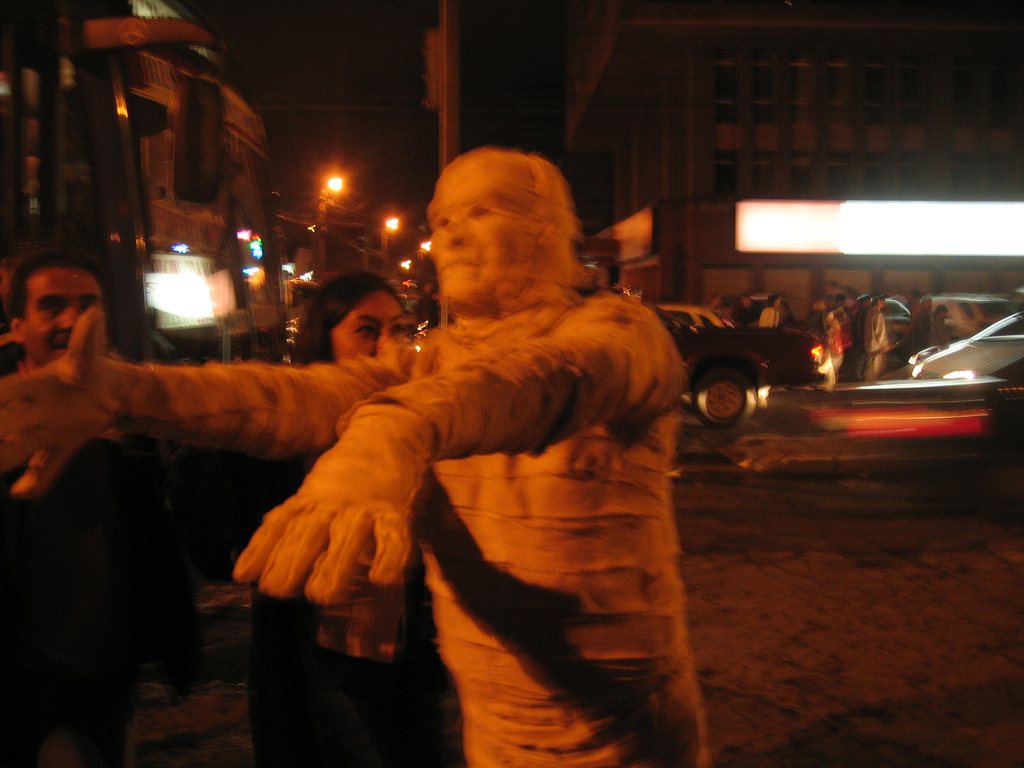K. E. Flann
Here you are in deep slumber, with dreams of spring wind. This is not the khamsin wind that rages over the desert, blinds the children, kills the oxen. Rather, it is a cool breeze that bathes the fifteen stars of Scorpio that materialize at sunrise.
You and your father, Sobekhotop the Brave, pharaoh before you, survey the ripple of the barley fields, gold in new dawn. He presses a hand on your shoulder, the actual skin you once had. Maybe he is about to speak to you directly, something he never did before your brother slit his throat with a sickle sword and then you, in turn, slit your brother’s.
Sobekhotop the Brave might have been half man and half god, the way people said pharaohs were, but he’d been too preoccupied with building irrigation systems to notice the ambitions of his lesser wives, one of whom would convince your brother to commit patricide.
Lesson learned. Take just one wife, the Great Royal Wife. If she is also a priestess, God’s Wife of Amun-Re, so much the better. The two of you will rule the sky, the earth, the underworld.
The price for loving just one woman is that you must now miss her for eternity.
What would your father say about that? Is it just as painful to miss a harem? Feel the divine breath as he gazes at you, the fiery gold of his pupils. He parts his lips, starts to speak. Will he offer advice? Will his mouth form your name?
Bad enough to be woken up. You never spent a moment like this with your father, whether with words or without. Anyone would be ill-tempered. But to be woken by intruders?
This is 1920 all over again. And 1536. And the year 968. And 3. Who could forget what happened in 3? You always defend your house, the house you built with her.
Humans love to amass material goods. You should know. You and your bride, Iset, annexed six countries to the upper and lower kingdoms. You enslaved whole populations to build places big enough to keep all this gold.
But right now, you just want everyone to pipe down and get out so you can get back to your father. These layers of linen strips are hot and they are itchy in the nether regions and you do not even have fingernails for scratching. Your bones are dust. Do these larcenists comprehend how sore it is to have dust bones? Sure, you’ve strangled an anthropologist or two. Anthropology is a word from that new language – Latin. You never woke long enough to learn much of it, but the word probably means looter. Ridiculous those Romans with their humanoid gods, too vain to know any good riddles. They were bickering concubines. Nothing primeval about them. Nothing larger than the sun, like Ra Who Is the Horus of Two Horizons.
It is He who makes it possible for you to see with your mind’s eye, for the gold of your sarcophagus to be as inconsequential as air. Look at these anthropologists here in your innermost chamber. Look at their sand-colored clothing, so drab, exposed knees pale as your linen ones. The men pick through your belongings as if they are at the outdoor market, as if you might be some peasant who’ll haggle for the best price. They are fatter than before, will be harder to choke. You sigh. You are so sleepy – 1920 was less than 100 years ago, and your limbs don’t want to awaken. But what is the alternative? At least there are only a couple of them. Dispatch them quickly, and the next time you stir, they’ll be bones, just more bones in the collection on the floor.
As they open the sarcophagus, light streams in, bright to you, though the tomb is lit only by torches.
How did your mind’s eye miss her? This woman behind them, this priestess.
See her now with the eyes Ra sowed in your head, the ones that squint through frayed threads. She wears the insolent half-pants like the others, but she has the cascade of black hair, the almond eyes, the beauty mark on her cheek, defiant chin. It is Iset. Can you be dreaming? Or can it be that He, in his wisdom, has rewarded her devotion, finally? And yours.
Sit up with the speed of a chariot.
The anthropologists leap back from your bedside, faces blanched. Surprise, as always, is miniature death, a soul departing the mouth. Upon its re-entry, some yell with the pain of the newly born. One flees, slipping down the passageway without a sound. Another backpedals, stumbles on a skull. Step over where he moans and take her in your arms, easy because she remains in the shock underworld, unblinking.
Ignore the men that paw at you. Carry her over your shoulder into the deeper rooms of your house. She screams now. Her shapely calves kick. But it is only because she does not yet remember. Finally, she falls limp, her breath in exile, save for dream-whimpers, the noise of a spirit in transition.
Slide the limestone door shut, easy for you to move, but impossible for those men. Muscles are only meat, burdensome weight strapped to bones, to what stays. You were a hunk of newly born flesh like them once, like her, defined sinew and oiled brown skin that she could not get enough of touching. But time makes dried locusts of everything. All that is moist becomes desiccate, like Ra, like the sun.
Cradle her in your arms. Stroke her hair while she slumbers. The hours are mere seconds, nothing compared to the eternity you’ll spend reunited, nothing compared to her real voice, distant now in memory, a falcon on the other side of the sea.
When she wakes, she thrashes as if in nightmare. She retreats, scrambles away as if you might try to stop her. Then, for a period, she crouches in a corner, peers through tousled hair. She sniffles.
Wait. Do not bend her to your will. Let time stretch her.
Eventually, she lowers herself, sits in the dust. Her knees unbend, one leg extending in front and then the other. She begins to speak in a tongue newer than Latin, one you’ve heard before, in 1920. You can decipher her meaning if you try.
Wave away her requests for the “bath room.” Iset would not trouble you about such matters as baths. Iset took what she wanted, did what she wanted, made no requests.
The woman huffs. “I don’t know how to say this,” she says, “but you are not good company. You have real issues.”
Curious. How can a person not know how to say what she is already saying? She speaks in a circle. Perhaps it is a riddle of the gods, and she, this priestess, is the vessel.
Words pour from her lips, sacred ankh-beetles that you see now only in dreams. She talks and talks. Her voice, even in this guttural language, is lullaby, and you lose her meaning for a time, tracing the notes. The gods do not usually speak so much. Perhaps she must wrest the demon of this current life. It must bleed out so that she can rise.
After a moment, she mentions her “sister,” a word you comprehend without effort. Iset, indeed, had a sister. They were so close that death collected them as one, a plague, and now they rest in a single tomb under the Lotus Flower of Djed-kara, the palace of pharoahs. Perhaps this is it. She has emerged. And yet still she insists on speaking in this foreign tongue. You must concentrate. Maybe she is too proud to admit, in the language you share, that she always chose her sister first and that Ra exacted his vengeance for it. It was something you thought you wanted until the god of radiance revoked your beloved’s heat, left her cold.
Rising, she dusts off her legs. She continues speaking, even while she assumes her full height, like the queen that she could be. “I’m not going to die. I’m not going to die. I’m not going to die.” She pauses, shuts her eyes. Then she slaps herself across the face, and she shakes out her arms.
Impressive. Still. Do not go to her. Let Iset shed the chrysalis.
She draws closer, skin like alabaster in the torchlight, and you pull a hand to your chest, let it nestle in your armpit. No one has come toward you like this in millennia. They always run. Before that, it was only Iset. Your subjects always prostrated themselves before you seven times and seven times, both on the belly and on the back. Tell yourself that your elbow is a fake broken wing, poised for action. Persuade yourself that you do not like the way she advances.
“But anyway, it’s like I was saying. My sister? She’s a licensed therapist.” She pauses again, studies you this time, puts a hand on her hip. “You know? Actually licensed.”
If you did, in fact, know, what reason would there be for her to speak? This is semantic trickery again, a snake that eats its own tail. Call on your mind’s eye. Decipher the secrets of this language.
She begins to describe something she calls “steps for anger management,” ticking them off on her fingers rapidly. “First of all, try using ‘I’ statements to keep the focus on yourself.” It is difficult to discern her meaning. On what might one focus other than oneself, the pharoah?
“Anger is stressful to your nervous system,” she says. “I mean, you could have a heart attack.” Her hands gesture. They are broad, as if she orates to a great crowd.
“Get lots of exercise, too. That’s another thing.” She brings a hand to her face as she thinks. There are freckles on her nose, distant birds on a blue sky. Your wife never had those. “What else? What else?” she says to herself. “Oh, I know.” She points at you, jabbing at the air. “Don’t use drugs or drink. You probably think it’s taking the edge off. Stop kidding yourself. It only makes you more of a dick.”
Confounding. Iset always liked you unyielding, liked you as more of a dick, as it were. When the twenty-one scribes of the Lower Kingdom threatened to revolt, she whispered hot in your ear, “Eliminate their names.” It was a fate worse than flogging to remove a man’s name from his tomb.
“You need to breathe deeply from your diaphragm,” the woman says, gesturing now at her middle. It is curious how much she moves her hands, not like a priestess, but like a dancer at the Nile Flood Feast, someone who launches skyward, flipping in air, to appease the goddess Sekhmet. And yet she does not dance.
“Go ahead,” she says. “Try it.”
When you don’t try it, she smiles. She steps forward again. She bends at the knees and squints, trying to see through your linen slit, craning her neck. Perhaps she will locate you under the fabric, discover where it ends and you start. An unfamiliar feeling rises from both close and far, the drumbeat of an army. Take a large step backward. Do not consider it retreat. There can be no invading force, save for anthropologists. Your enemies blew away with the sands long ago. Realize, suddenly, that the sensation comes instead from the canopic jar in your sarcophagus, the one that holds your vital organs. It thumps in the other room as if it is in your chest. Perhaps with her erratic movements she controls it. Here is the “heart attack” she promised to wage against you.
“Repeat a safe word like ‘relax’ or whatever,” she says. “Repeat that while breathing deeply until the feeling goes away. Like this.” She pulls air into her chest and lets it leak out her nostrils, like a horse.
These could be just the death throes of the demon. Wait. Wait. Put your arms down.
“You should try journaling,” she says.
Journaling… ensure that you understand this correctly. The Son of Sobekhotop the Brave – the Mighty Bull, He Who Makes Hearts Live – she would have him write? Like a scribe?
“But the biggest, biggest thing…” Here, she claps her hands for emphasis and it echoes through the chamber. She licks her lips, tight in a white line that divides her from Iset. “Read self-help books,” she says. “I swear it will change your life. I can give you some titles. Do you have a pen?”
Self. Help. Yes. Excellent.
You strangle her until she falls unconscious.
Silence. Thank Amun-Re.
You sigh. Probably, you should just go back to bed. Human men prize most the women that were never theirs. Those looters are coming for her, just as they came for your jewelry and gold furniture. Those loud shoes approach even now.
But what if she wakes this time as her true self, the priestess, the Chief King’s Wife? What if she does not? She would perhaps still be good company for a decade or two. Even in spite of her impertinence. Because of it.
And then also, strangling more anthropologists seems preferable to sleep. The way their tendons cave in and their bodies collapse, give way to you. All you really want is that moment when their eyes search your face, like “Father, is that you?”
Part of you knows, though, that if you keep her, they’ll find that magic scroll in the other room with your canopic jar, say incantations they don’t even understand, and disintegrate you in a divine wind. They hate your power.
All you have to do, just for today, is stop exerting it. Retrace your steps. Leave her here, this faulty version of her that is the water’s reflection of faulty you who cannot let go. Two hundred years will be tomorrow.
There is some kind of machine-animal at the door. The voices of men.
Touch her hair. Imagine how it would feel under the pads of fingers, the fine sensation of strands against skin. What would it be like to wake in the royal bed again, Iset tickling you, giggling, her fingers nuzzling into your ribs?
She stirs, presses her face to your hand, gazes up. But do not falter. These eyes glisten, warm in the torch light, boundless. They regard only you, in a way that no one you loved ever did. Do not try to own the sun.
Push a revolving gold panel, steal down a passage way.
Climb into bed.
That woman – that Iset imitation. Her notion is preposterous.
Feelings do not disappear with one’s breath. They are the eternal element. Perhaps, they fragment and scatter. Perhaps they cling to the lining of the sarcophagus in the dark before your eyes, constellations, fires in a distant place that is still your home.
K.E. Flann is the author, most recently, of Get a Grip, a story collection and winner of the George Garrett Fiction Prize. Her fiction has appeared in Shenandoah, The North American Review, The Michigan Quarterly Review, New Stories from the South, and other publications, and she teaches at Goucher College in Baltimore, where she lives with her husband, Howard. Her previous publications include another story collection, Smoky Ordinary, and novella entitled Mad Dog. Find out more at www.kathyflann.com or follow her on Twitter @kathyflann.




